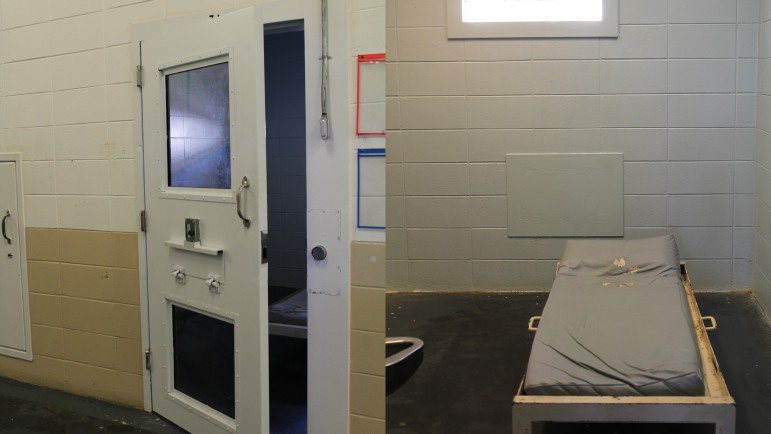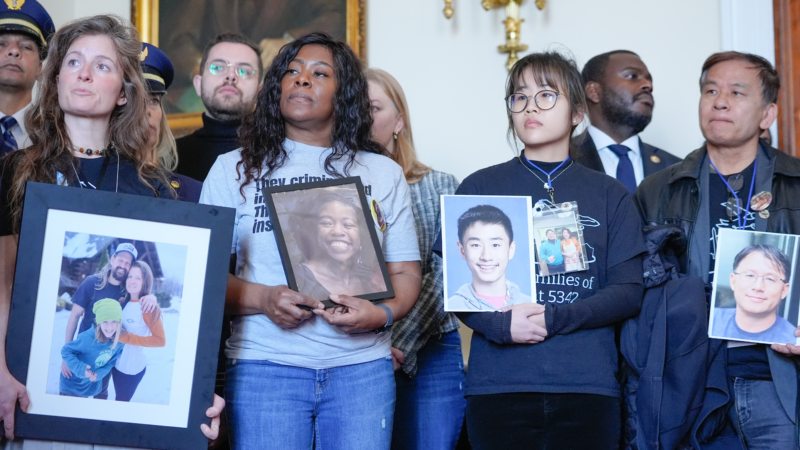Alabama Says its $900 Million Prisons Plan Can Help Fix Mental Health Crisis. Some Disagree.
Alabama’s prisons are severely overcrowded and understaffed. And in recent years, there’s been what some have called a suicide epidemic among inmates. As the state Department of Corrections continues to grapple with a federal lawsuit over mental health care, officials say they have a plan: they want to build three big regional prisons for men. But not everyone agrees that’s the best solution.
Kilby Correctional Facility, just outside of Montgomery, looks like a group of warehouse-style buildings surrounded by a tall barbed wire fence. Inside, inmates have just finished lunch. The hallways are loud and sounds echo off the walls. Warden Leon Bolling leads the way to the mental health crisis area. He says this area is for prisoners at risk of suicide.
“Everything is supposed to try to be free from person being able to do something to harm themselves,” Bolling says.
Inmates in these mental health crisis units often stay in their cells alone all day. They are constantly monitored by staff, according to prison officials. But some say that’s not enough.
Suicide is a problem in Alabama’s prisons. In the past fifteen months, fourteen inmates have died by suicide. Advocacy groups say that amounts to one of the highest suicide rates in the nation. In 2017, a federal judge said mental health care in state prisons was “horrendously inadequate.” The Department of Corrections is under court order to hire more staff and improve treatment. But this is a challenge, according to Jeff Dunn, commissioner of the DOC.
“Mental health professionals in general across the state and across the country are hard to come by,” Dunn says, “and asking folks to come and work in the prison environment makes it even more difficult. And let’s be frank, the prison system is not the ideal environment to seek mental health treatment.”
It’s not just mental health care workers. Dunn says it’s difficult to get anyone to work in state prisons. The system is significantly understaffed and overcrowded. Correctional officers often work overtime and hundreds of inmates sleep side by side in large dormitories. It is one of the most violent prison systems in the country. The buildings are old and in need of maintenance. Recently, Commissioner Dunn and Gov. Kay Ivey announced a plan to address several of these issues. They want to close about a dozen male prisons and replace them with three regional prisons, bigger buildings that would house more inmates.
“We’ve got to … get to a better place in the infrastructure,” Dunn says, “if we ever have hope of changing this system and reforming it the way we want to reform it.”
He says one of the new prisons would be specifically for inmates with severe mental health needs. That facility would also provide more advanced medical services. The idea is to streamline resources in one location. But not everyone agrees consolidating prisons is the answer. Maria Morris, a lawyer with the Southern Poverty Law Center, is one of the plaintiffs in an ongoing federal lawsuit with the DOC about mental healthcare.
“The prison buildings are atrocious,” Morris says. “I don’t disagree. But they (DOC) need to be thinking through what has to be the priority.”
She says problems like suicide and violence in state prisons are the result of bad management and understaffing – something new buildings won’t fix. Morris also says bigger prisons can be harder to manage.
David Wise, a retired warden who spent 28 years working for the DOC, agrees. He says staffers at prisons that would close under the new plan might not move to where the regional prisons are. Wise says the focus should be on keeping employees.
“That would be my goal, is to get good people,” he says. “You can have all these pretty buildings, all these pretty cameras, all you want, it’s not gonna solve the part of human interaction. Prison takes human interaction to keep control.”
Commissioner Dunn says they haven’t yet decided where the new prisons will be built, but they want the location to be most convenient for employees. Dunn recently requested an extra $31 million in the state budget to increase salaries and hire 500 more correctional officers. He says new buildings can help attract candidates, including mental health care professionals.
“We believe that addressing the infrastructure piece also will help with staff morale, will help with staff effectiveness, will create a better working environment,” Dunn says.
The plan is estimated to cost around $900 million, but the DOC says that by closing several facilities, it will pay for itself. Unlike previous plans, this one might not require legislative approval if the state decides to lease the new facilities from a contractor. Officials say that will be determined later this year after they review project proposals.
President Trump set to deliver first State of the Union address of his second term
Facing low approval ratings and ahead of midterm elections in November, President Trump delivers the first State of the Union address of his second term as president Tuesday night.
U.S. House rejects aviation safety bill after Pentagon abruptly withdraws support
The House of Representatives narrowly rejected a bipartisan aviation safety bill that was spurred by the deadly midair collision near Washington, D.C. after the Pentagon abruptly withdrew its support.
China and the US alter foreign aid strategies
China's foreign aid strategy has shifted in the last few decades and now its model may be the one the US is adopting as China moves away from it.
Flavor Flav is among women’s hockey team fans outraged by presidential snub
The rapper, who also serves as the official "hype man" for multiple U.S. Olympic teams, invited the female hockey players to Las Vegas for a "real celebration."
Flavor Flav is among women’s hockey team fans outraged by presidential snub
The rapper, who also serves as the official "hype man" for multiple U.S. Olympic teams, invited the female hockey players to Las Vegas for a "real celebration."
Flavor Flav is among women’s hockey team fans outraged by presidential snub
The rapper, who also serves as the official "hype man" for multiple U.S. Olympic teams, invited the female hockey players to Las Vegas for a "real celebration."








